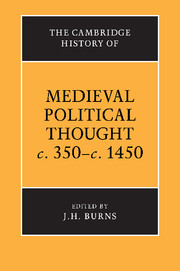Book contents
- Frontmatter
- Introduction
- I Foundations
- II Byzantium
- III Beginnings: c. 350–c. 750
- IV Formation: c. 750–c. 1150
- V Development: c. 1150–c. 1450
- 13 Introduction: politics, institutions and ideas
- 14 Spiritual and temporal powers
- 15 Law
- 16 Government
- 17 Community
- 18 The individual and society
- 19 Property and poverty
- Conclusion
- Biographies
- Bibliography
- Index of names of persons
- Index of subjects
- References
18 - The individual and society
from V - Development: c. 1150–c. 1450
Published online by Cambridge University Press: 28 March 2008
- Frontmatter
- Introduction
- I Foundations
- II Byzantium
- III Beginnings: c. 350–c. 750
- IV Formation: c. 750–c. 1150
- V Development: c. 1150–c. 1450
- 13 Introduction: politics, institutions and ideas
- 14 Spiritual and temporal powers
- 15 Law
- 16 Government
- 17 Community
- 18 The individual and society
- 19 Property and poverty
- Conclusion
- Biographies
- Bibliography
- Index of names of persons
- Index of subjects
- References
Summary
We tend to think of the Middle Ages as a communal or even collectivist epoch, in which there was a sense of ‘the real personality of the group’, ‘absorption of the individual by the community’, in which – to go back to Burckhardt –‘man was conscious of himself only as a member of a race, people, party, family, or corporation – only through some general category’, A quite recent study of medieval social language assumes the existence of a ‘'ommunitarian’ ethos. The distinction between modern individualism and medieval collectivism goes back, through Tönnies and Durkheim, to Romanticism and the Enlightenment. The pioneer of the study of medieval political thought, Otto von Gierke (1841–1921), believed that, in towns, gilds and other ‘chosen groups’, individuals submitted willingly to communal norms and identified themselves morally with the group, in the tradition of Germanic Genossenschaft (fellowship). But now the picture is changing. A variety of social structures and of attitudes to the individual is beginning to emerge. ‘The idea of a fixed society, neatly parcelled into categories by rigid, impassable barriers, is parfaitement inexacte. Chronicles composed by monks and friars, who believed men ought to value community, and works by officials anxious to promote civic harmony, cannot be taken at face value. The actual evidence produced by Gierke turns out, on inspection, to be slender indeed: phrases such as ‘the consent and will of the city’ no more prove the existence of a collectivist attitude than do modern phrases such as ‘the spirit of the Labour (or Conservative) party’ or ‘the will of the electorate’.
- Type
- Chapter
- Information
- The Cambridge History of Medieval Political Thought c.350–c.1450 , pp. 588 - 606Publisher: Cambridge University PressPrint publication year: 1988
References
- 9
- Cited by

